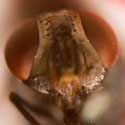About Us 
History of IPM Florida
This Web site will help link Florida's research, extension, teaching, regulatory, administrative, and clientele communities involved in integrated pest management (IPM) and biological control (BC), regardless of their employing institution, geographical location or area of activity, i.e., agriculture, natural resources, and urban environments. This IPM-BC web site also provides a point of contact for linking Florida within the region, across the U.S., and throughout the world. It is justified because Florida has a major, ongoing investment in IPM and its base BC strategy. However, most of the work is accomplished by individuals who develop and pursue independent projects, rather than by coordinated, multidisciplinary and multi-organizational teams. This fragmentation has limited the visibility, financial support and effectiveness of IPM and BC in Florida, particularly highly promising large-scale projects. As a result, potentially valuable IPM and BC research projects are often delayed, reduced to a very limited scale, or not undertaken. Associated extension programs consequently lack the demonstration projects necessary to implement new, reliable, cost-effective IPM and BC technologies. Educational efforts similarly are forced to rely on concepts and historical examples, without the benefit of very stimulating contemporary successes.
The Web site is designed to assist extension specialists, county extension faculty, master gardeners, master naturalists, receptive producers and land managers, and urban constituents with the education and training process by making information on new pest management technologies more accessible. To develop site-specific IPM and BC technologies more rapidly, and encourage their adoption at the local or grassroots level is a major challenge facing Florida. These technologies are needed because of increasing concerns about environmental contamination, food safety, and human and animal health resulting from the indiscriminate use, and often misuse, of pesticides in Florida. Additionally, chemical pesticides have become too expensive for use in many cropping systems and ineffective in others, particularly if there are outbreaks of non-indigenous or secondary pests. The cost of purchasing and applying pesticides has escalated, new worker protection laws have extended reentry periods, pesticide registrations are becoming more limited, phytotoxicity destroys crops, target species are evolving resistance to pesticides, and unacceptable non-target effects are more detectable than in the past. By accelerating the development and implementation of alternative technologies, we can maximize current and emerging agricultural productivity in an increasingly competitive global market, protect Florida's fragile ecosystems, conserve our natural resources, and assure environmental safety.
 We combined IPM and BC at this Web site because biological control
is practiced within the context of IPM. IPM is an ecologically based
approach to pest prevention and elimination that depends on natural
controls, pest exclusion, and chemical pesticides, as needed. Natural
controls include crop management, weather, host resistance, and the
use of biological control agents. R. Smith and R. van den Bosch defined
IPM (Integrated Control) as the use of "all suitable techniques
either to reduce pest populations and maintain them at levels below
those causing economic injury or to so manipulate the populations
that they are prevented from causing such injury." We can make
maximal use of natural controls by understanding the limitations
and liabilities of pesticides, determining economic injury thresholds
for priority crops, scouting and maintaining surveillance to determine
pest status, developing and implementing precision technologies for
using pesticides, and increasing the availability and use of natural
controls, emphasizing BC. BC is the use of living predators, parasites,
pathogens, antagonists and competitors to reduce the damage caused
by pest populations.
We combined IPM and BC at this Web site because biological control
is practiced within the context of IPM. IPM is an ecologically based
approach to pest prevention and elimination that depends on natural
controls, pest exclusion, and chemical pesticides, as needed. Natural
controls include crop management, weather, host resistance, and the
use of biological control agents. R. Smith and R. van den Bosch defined
IPM (Integrated Control) as the use of "all suitable techniques
either to reduce pest populations and maintain them at levels below
those causing economic injury or to so manipulate the populations
that they are prevented from causing such injury." We can make
maximal use of natural controls by understanding the limitations
and liabilities of pesticides, determining economic injury thresholds
for priority crops, scouting and maintaining surveillance to determine
pest status, developing and implementing precision technologies for
using pesticides, and increasing the availability and use of natural
controls, emphasizing BC. BC is the use of living predators, parasites,
pathogens, antagonists and competitors to reduce the damage caused
by pest populations.
Immediate Objectives of the Florida IPM-BC Program
Determine needs and opportunities for IPM-BC in Florida
- Identify key crops, commodities, pests and natural enemies
- Develop shared objectives for rapid progress
- Increase financial support for IPM and BC research and education
- Survey Florida for systems that can advance IPM and BC
- Describe successful IPM and BC projects in Florida
- Submit the CSREES IPM 5-year plan
- Interface the UF/IFAS, IPM-BC program with the Florida First Initiative
Foster interdisciplinary collaboration in IPM-BC
- Establish coalitions of entomologists, plant pathologists, weed scientists and others
- Facilitate partnerships among colleagues focused on IPM-BC, including user groups
- Enhance research projects to derive efficacy data
- Build institutional partnerships to increase efficiency and effectiveness
- Institute a competitive IPM-BC mini-grants program
Enhance IPM-BC communication
- Identify expertise in specific crops, commodities, pests and natural enemies
- Establish a responsive IPM-BC office
- Develop and maintain an IPM-BC Web site
- Establish an advisory committee and conduct semi-annual meetings
- Maintain state, regional, national and international IPM linkages
Increase the delivery of IPM-BC
- Emphasize county extension programs
- Incorporate IPM and BC options into the pest management guides
- Collaborate with authors to publish IPM and BC information
- Advance commercial IPM and BC in Florida
- Enhance teaching of IPM and BC